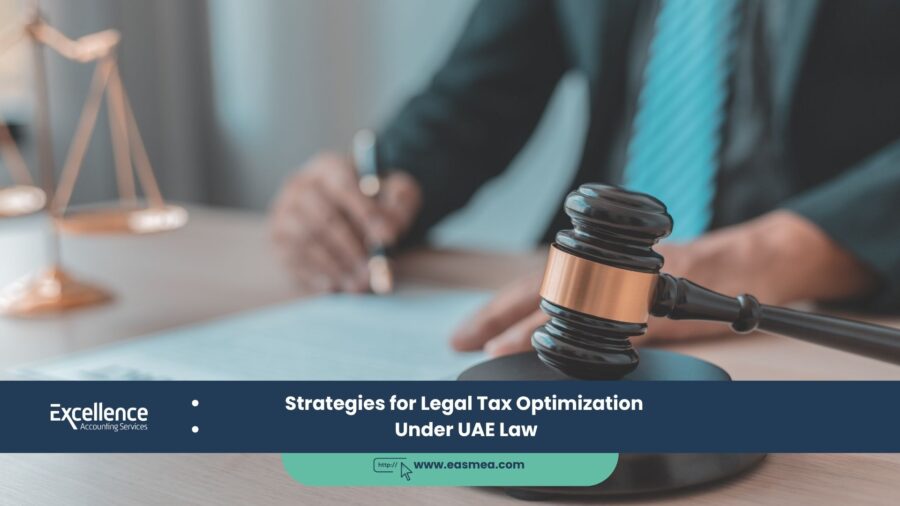Strategies for Legal Tax Optimization Under UAE Law
The introduction of Corporate Tax in the UAE has fundamentally shifted the business landscape. While the 9% rate is globally competitive, the primary goal of any prudent business is to manage its tax liabilities effectively and legally. This is where tax optimization comes into play. It is not about finding loopholes or evading responsibilities; it is the strategic and lawful arrangement of a company’s financial affairs to minimize tax payable, using the full extent of the allowances, deductions, and reliefs provided within the UAE Corporate Tax Law.
- Strategies for Legal Tax Optimization Under UAE Law
- The Bright Line: Tax Optimization vs. Tax Evasion
- Core Strategies for Corporate Tax Optimization
- The Role of Technology in Tax Optimization
- What Excellence Accounting Services (EAS) Can Offer
- Frequently Asked Questions (FAQs)
- Build a Tax-Efficient Future for Your Business.
This article provides a comprehensive framework for businesses seeking to legally optimize their tax position. We will draw a clear line between legitimate tax planning and illegal tax evasion, and explore a range of actionable strategies—from structuring your business and managing expenses to leveraging specific reliefs and exemptions. For businesses in the UAE, understanding these strategies is no longer just a financial advantage; it is a core component of sustainable and competitive business management.
Key Takeaways for Tax Optimization
- Optimization is Legal, Evasion is Not: Tax optimization uses the law as a tool, while evasion illegally ignores it. The distinction is critical.
- Maximize Legitimate Deductions: The most direct way to reduce taxable income is by diligently tracking and claiming all “wholly and exclusively” incurred business expenses.
- Utilize All Available Reliefs: The law provides specific reliefs, such as Small Business Relief, which can eliminate tax liability for qualifying companies.
- Structure for Efficiency: Decisions around business structure, related-party transactions, and the formation of Tax Groups have significant long-term tax implications.
- Impeccable Record-Keeping is Non-Negotiable: Every optimization strategy relies on robust documentation. An FTA-accredited accounting system is essential.
The Bright Line: Tax Optimization vs. Tax Evasion
Before diving into strategies, it’s crucial to understand the legal and ethical boundaries.
- Tax Optimization (or Planning): This involves arranging your business affairs to minimize tax liability using the provisions of the law. Examples include claiming all allowable deductions or choosing a tax-efficient depreciation method. This is legal and prudent.
- Tax Avoidance: This term often refers to using legal loopholes in a way that goes against the ‘spirit’ of the law. While sometimes technically legal, it can be viewed as aggressive and may be challenged by tax authorities under General Anti-Abuse Rules (GAAR).
- Tax Evasion: This is the illegal, deliberate non-payment or under-payment of taxes. Examples include hiding income, falsifying expense claims, or not registering for tax when required. This is a criminal offense with severe penalties.
Our focus is squarely on tax optimization—using the letter of the UAE Corporate Tax Law to achieve the most efficient financial outcome for your business. This requires expert guidance from services like a business consultancy.
Core Strategies for Corporate Tax Optimization
Strategy 1: Maximizing Allowable Business Deductions
This is the most fundamental optimization strategy. Every dirham of a legitimate business expense you claim reduces your taxable income by a dirham. The key is to be meticulous.
- General Deductibility Rule: An expense is deductible if it is incurred “wholly and exclusively” for the purpose of the business and is not capital in nature.
- Salaries and Wages: Ensure all salaries, including to owners, are at a reasonable market rate and properly documented through a payroll service.
- Financing Costs: Interest on business loans is generally deductible, subject to certain limitations.
- Repairs and Maintenance: Costs to maintain existing assets are deductible. Distinguish these from capital improvements, which are treated differently.
- Partial Deductions: Be aware of rules for expenses with partial deductibility, such as client entertainment (50% deductible).
Effective accounts payable and receivable management ensures all costs and revenues are captured accurately.
Strategy 2: Leveraging Tax Reliefs and Exemptions
The UAE Corporate Tax Law contains several specific provisions designed to relieve the burden on certain businesses and types of income.
- Small Business Relief (SBR): If your business has revenues of AED 3 million or less in a tax period, you can elect for SBR and be treated as having zero taxable income. This is a powerful tool for startups and SMEs.
- Participating Interest Exemption: Income (dividends and capital gains) from a qualifying “participating interest” (generally, a holding of 5% or more in another company held for at least 12 months) is exempt from Corporate Tax. This prevents double taxation within corporate groups.
- Qualifying Free Zone Person (QFZP) Regime: While complex, this allows Free Zone companies that meet stringent conditions to benefit from a 0% tax rate on their “Qualifying Income.” A thorough feasibility study is needed to determine if this structure is beneficial.
Strategy 3: Strategic Asset and Capital Gains Management
How you manage your capital assets can have a direct impact on your tax bill, both annually and upon disposal.
- Tax Depreciation: The law provides for tax depreciation on capital assets. Choosing the most appropriate depreciation schedule allowed can optimize your annual deductions.
- Capitalizing vs. Expensing: Correctly identifying whether an expenditure is a repair (expense) or an improvement (capitalized) is crucial. Capitalizing an improvement increases the asset’s cost base, which reduces the taxable capital gain when you eventually sell it.
- Intra-Group Transfers: The law allows for tax-neutral transfers of assets and liabilities between members of the same qualifying group, preventing a tax charge from arising on internal reorganizations.
Strategy 4: Effective Business Structuring and Tax Grouping
Strategic decisions made at the company formation stage and beyond can lock in tax efficiencies.
- Tax Grouping: Companies that are at least 95% commonly owned can form a Tax Group. This allows them to file a single tax return and, crucially, offset losses from one group company against the profits of another. This is one of the most effective optimization strategies for businesses with multiple entities.
- Transfer Pricing: For transactions between related parties, you must ensure they are conducted at “arm’s length” (market value). Proper transfer pricing policies prevent the FTA from adjusting your taxable income upwards. This may require a formal business valuation.
The Role of Technology in Tax Optimization
None of these strategies are possible without flawless data. An FTA-accredited accounting system is the bedrock of any tax optimization plan.
Zoho Books empowers businesses to implement these strategies by providing a structured environment for financial data. It allows you to:
- Tag and Categorize Expenses: Easily categorize every expense to ensure maximum deductibility and identify partially deductible items.
- Maintain a Fixed Asset Register: Accurately track the cost base of your assets, manage depreciation schedules, and calculate capital gains upon sale.
- Generate Compliant Reports: Produce IFRS-compliant financial statements that form the basis of your tax return, saving time and reducing errors.
- Provide an Audit Trail: Every transaction is documented, providing the necessary evidence to support your tax position during an FTA audit. A professional accounting system implementation sets you up for success.
What Excellence Accounting Services (EAS) Can Offer
Legal tax optimization is a sophisticated process that requires a deep understanding of the law and your business’s unique circumstances. EAS provides expert advisory to help you build and implement a robust tax strategy.
- Strategic Tax Planning: Our Corporate Tax specialists analyze your business to identify all available optimization opportunities, from expense management to corporate restructuring.
- CFO Services: We offer high-level strategic guidance through our CFO services, integrating tax planning into your overall financial strategy for long-term growth.
- Due Diligence for Acquisitions: Before you acquire another business, our due diligence service assesses its tax history and structure to identify risks and optimization potential.
- Internal Audit: Our internal audit services can review your current processes to ensure you are capturing all the data needed for effective tax planning and compliance.
Frequently Asked Questions (FAQs)
This is a key strategic question. A reasonable salary paid to an owner is a deductible expense for the company, reducing its Corporate Tax liability. Dividends are paid out of post-tax profits. Often, a combination of a market-rate salary and dividends is the most efficient structure. This requires careful modeling based on your company’s profitability and your personal financial needs.
No. The UAE Corporate Tax law specifically limits the deductibility of “entertainment, amusement, or recreation” expenses to 50% of the amount incurred. So, for a AED 500 client lunch, only AED 250 is tax-deductible.
Usually, yes. However, if your business has incurred a significant tax loss in a period where you also qualify for SBR, you might choose not to elect for the relief. This would allow you to record the tax loss, which you could then carry forward to offset against future profits in years when your revenue exceeds the SBR threshold.
The law limits the amount of net interest expense a business can deduct to 30% of its EBITDA (Earnings Before Interest, Tax, Depreciation, and Amortization). This is an anti-abuse rule to prevent companies from loading up on debt (often from related parties) to artificially reduce profits. Any disallowed interest can typically be carried forward and deducted in future years.
No, this is a common misconception. To get the 0% rate, a Free Zone business must be a “Qualifying Free Zone Person” (QFZP) and only earn “Qualifying Income.” Income from dealing with mainland UAE customers, for example, is generally taxed at 9%. The QFZP regime is complex and requires strict adherence to its conditions.
You need to maintain comprehensive records, including valid tax invoices for all expenses, contracts, bank statements, and payroll records. For every expense, you must be able to demonstrate to the FTA that it was genuinely incurred for the purpose of your business. This is why organized accounting and bookkeeping is essential.
No. To form a Tax Group, the parent company must own at least 95% of the share capital and voting rights in the subsidiary. Both companies must also be UAE residents.
No. Donations are only deductible if they are made to a “Qualifying Public Benefit Entity” that is officially listed in a Cabinet Decision. Donations to unlisted charities or non-profit organizations are not deductible for Corporate Tax purposes.
If both businesses are held under a common ownership structure that meets the 95% threshold, forming a Tax Group is the ideal strategy. This allows the losses of one company to be offset against the profits of the other on a consolidated tax return, reducing the overall tax payable by the group.
Your tax strategy should be dynamic. It’s advisable to conduct a review with your tax advisor at least once a year, before your financial year-end. You should also revisit it whenever there is a significant change in your business, such as a major acquisition, expansion into new markets, or changes in the ownership structure.
Conclusion: Proactive Planning is the Key to Efficiency
Legal tax optimization is not an afterthought; it is an integral part of proactive financial management. By embedding these strategies into your business operations—supported by robust accounting practices and expert advice—you can manage your tax obligations efficiently, reduce financial leakage, and free up capital for reinvestment and growth. In the new tax era of the UAE, the most successful businesses will be those that are not only compliant but also strategically intelligent.




